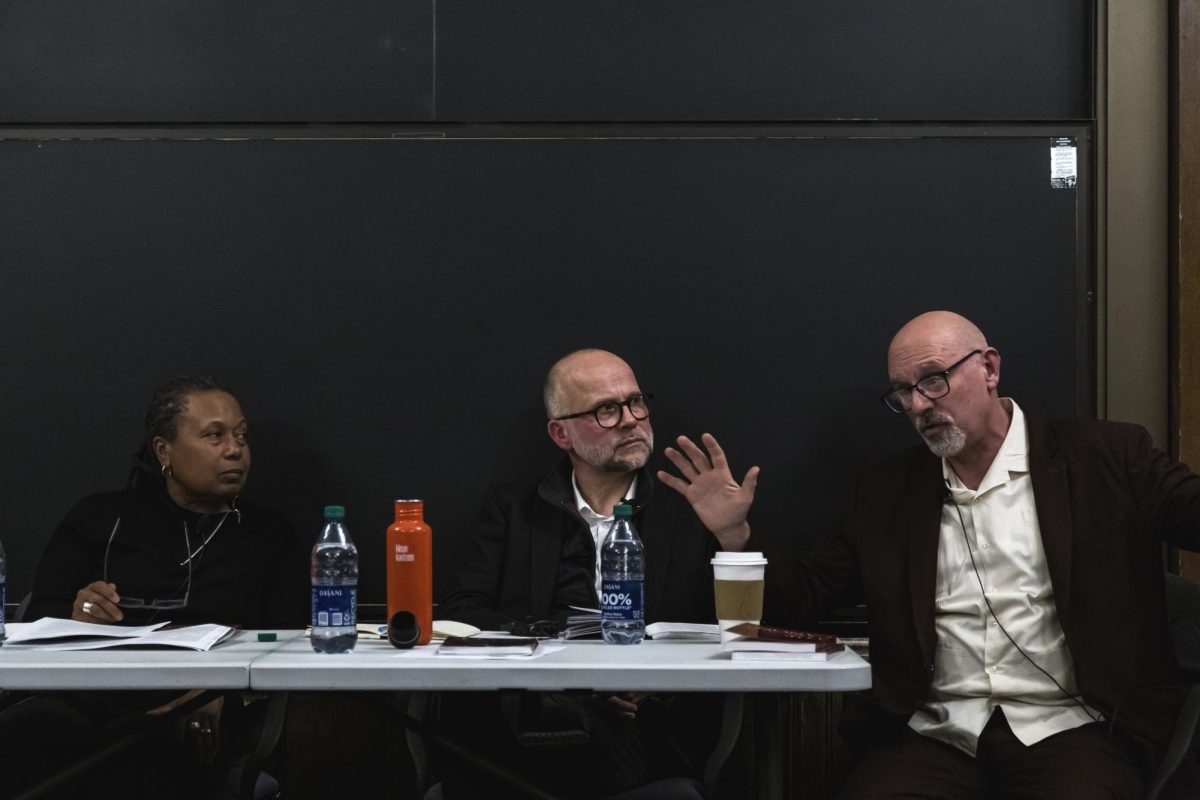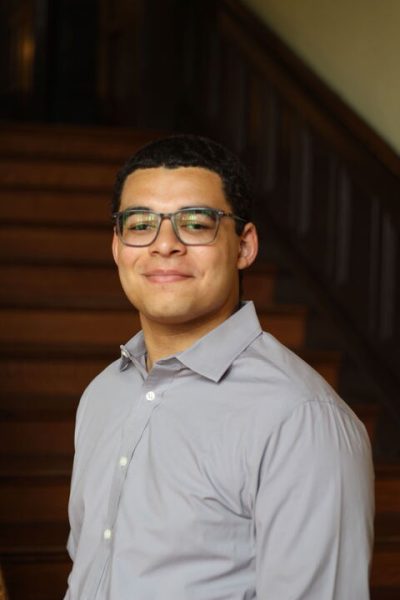The Chicago Center for Contemporary Theory hosted a panel discussing the Kalven Report on Monday, January 22. Professors Cathy Cohen, Christopher Wild, and Tom Ginsburg led the conversation.
Published in 1967, the Kalven Report was the product of a committee formed by George W. Beadle, who served as president of the University from 1961 to 1968. The document details the University’s official “role in political and social action,” emphasizing a commitment to intellectual inquiry, diversity of thought, and individual freedom in political and social matters. Since its creation, it has been the framework for protecting free speech on campus for students and faculty alike, while enforcing a neutral stance for the institution itself.
According to Cohen, Kalven’s protections have been clarified in the face of recent protests regarding the Israel-Palestine conflict. “As I’ve heard the stories of faculty being told to take down political posters off their doors for fear they might offend or have students feel unsafe… and as I’ve watched student organizations such as Students for Justice in Palestine be suspended at different universities, suggesting that their rhetoric, their claims and their vision of history, are somehow threatening and inciting violence, I [have] take[n] comfort in the University’s commitment to free speech and its purported stance of neutrality [through Kalven],” Cohen said.
A self-proclaimed “Kalvenist”—i.e. defender of the Kalven Report—Ginsburg added that it is also a key tool in ensuring that the University isn’t represented to the public by a singular voice.
“Kalven… [takes] the [University] president’s voice off the table,” Ginsburg said. “The alternative is that the president can speak for all of us, [but] that unleashes a process of people lobbying to get their preferred statement issued… [and those] processes are going to favor the powerful.”
All members of the panel seemed to agree that the Kalven Report is far from perfect. In particular, Cohen argued that it may take freedom of expression too far by not placing limitations on things like hate speech, explaining that this has been especially problematic in the selection of visiting speakers.
“When speakers who question the intellect and full humanity of Black people are invited to campus to quote, unquote, debate our worthiness as citizens and people, [it] is clear that the University’s commitment to freedom of expression will come at the expense of those who are most vulnerable in our communities,” Cohen said. “As a community, we have to struggle with the question of what does the ‘defense of freedom of expression’ mean? Does it mean that white supremacy, antisemitism, misogyny, homophobia, Islamophobia, must be afforded the rights and opportunity to be aired on a university campus?”
Cohen further clarified that the University’s priority should be maintaining freedom of expression, while also “minimizing harm” such that students can engage in the exchange of ideas in a safe environment—something that Kalven does not currently account for.
Cohen cited the recent use of chemicals to control protestors at Columbia University as reason for her newly “mellowed” views on the Kalven Report and its protections.
Similarly, Ginsburg also voiced dissatisfaction with the vagueness of Kalven, focusing on what constitutes an “exceptional instance.” Described in the report as “instances… in which the society, or segments of it, threaten the very mission of the university and its values of free inquiry,” this exception allows the University to speak as an institution on political and social matters.
“It would be nicer if [the exception] was clear, because then we would have better grounds to debate as a community when we want the University to speak and when we don’t,” Ginsburg said. “[Our current policy is] ‘we’re not going to speak out until we do,’ and I’d like to have some clear principles about exactly when those exceptions are.”
Many community members have also voiced concerns with how the Kalven Report applies to the University’s choices for investment and divestment, which to some are not neutral. For Ginsburg, however, divestments and investments are not necessarily indicative of the University’s views.
“I think that the rationale is that if we were to divest, it would be simply as trying to make a statement,” Ginsburg said. “We would be, as a University, saying ‘we’re not going to invest in fossil fuels,’ [but] most divestment is not actually in terms of something like the fossil fuel industry where there’s a world market. Our purifying ourselves by divesting is not going to make a bit of difference in oil [because] it’s very hard to actually influence things.”
“Universities are no longer or primarily what we think of as teaching and research units across divisions or arts and sciences,” Cohen said. “[They] provide employment, medical care, housing, schooling, policing, for larger and larger areas and cities, like on the South Side of Chicago, so to think that there is neutrality in investment from an entity like that is naive.”
According to Cohen, the complexities of modern institutions require a more nuanced understanding. She called for a broader exploration of how the Kalven Report’s applicability extends to these multifaceted roles and responsibilities undertaken by universities in the contemporary landscape while still fulfilling its commitments to its students. “I’m not suggesting we abandon our commitment to free speech, but that we recognize a twin anchor for our work—expansive inclusion: the idea that we are responsible for creating an inclusive learning environment where every student might have the right to contribute to the interrogation of ideas, the production of novels that contribute toward the greater good,” Cohen said.
Correction, February 3, 2024: A previous version of this article misattributed quotes given by Tom Ginsburg.











Matthew G. Anderson, '96, Booth MBA / Feb 1, 2024 at 11:21 am
Harry Kalven’s actual book, “A Worthy Tradition: Freedom of Speech in America,” is still generally available. It was produced posthumously by his son, with the assistance of Yale Law’s Owen Fiss, who also taught at UChicago. Kalven also examines freedom of association which is equally if not more critical. Free speech is otherwise much like antitrust law: it consists of busy-work for lawyers, and interpretative opportunism by government or the political class: Free speech is not a policy however, or a set of permissions stemming from “experts”or authorities; it is a freedom you enjoy at your natural discretion, and from your natural intelligence, as a natural right. It also includes not merely speaking, but speaking out, even if some interruption is caused. Free speech doctrine is not “Robert’s Rules of Order” which organizes the group. The group is not primary to free speech liberty: individuals are. Universities (and other corporations) prioritize secondary group order, social conformity and control, and an atmosphere that does not alienate corporate donors, federal granting, or political special interests. This is among the reasons UChicago’s Article 21 and the “Chicago Principles” are inherently misguided both in law, and theories of learning. At an institutional level, free speech also encompasses tangible, structural organizational factors that actually produce (rather than merely symbolize) plurality, and create dynamic disruption across the disciplines. Readers may enjoy “The University of Chicago Isn’t Living Up to Its “Principles” published at the James G. Martin Center for Academic Renewal; “The Chicago Principles Are For Disciplining Dissent—Not Protecting Speech” in the Chicago Maroon, and “Law Professors Hate Free Speech” published by the National Association of Scholars, where I discuss these issues further in the context of the University of Chicago.